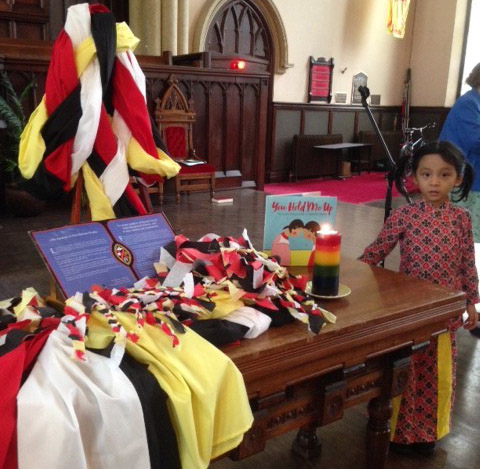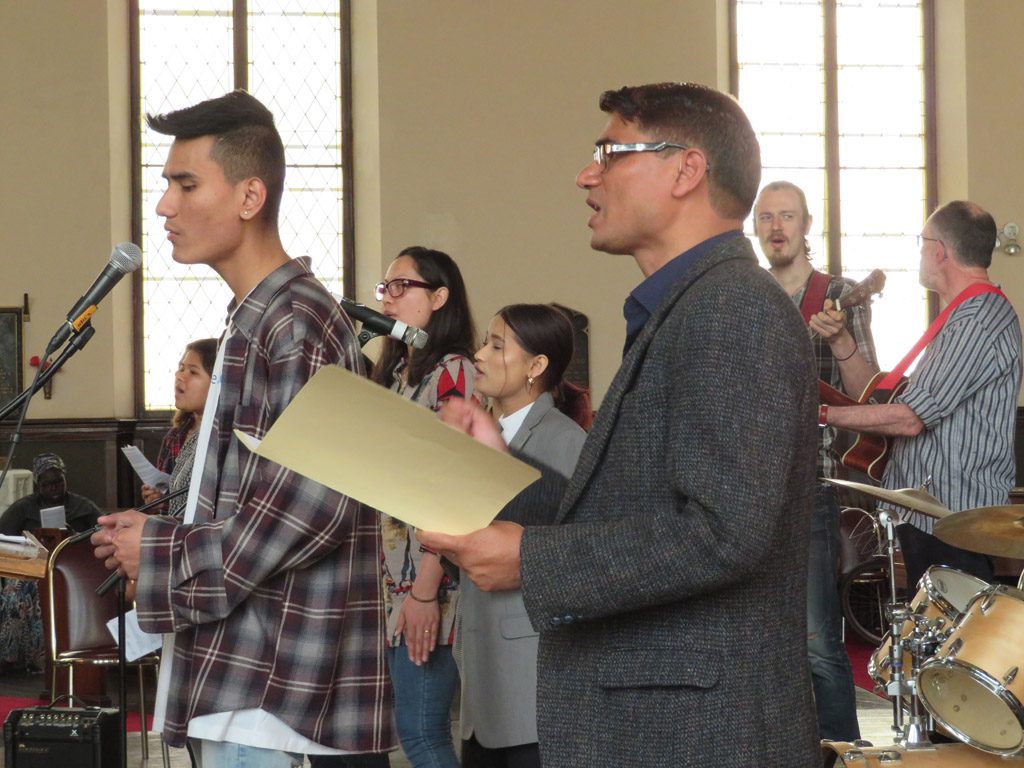Knox United Church is a dynamic, urban, intercultural ministry. We seek to be a Christian community made up of disciples committed to the gospel of Jesus Christ, responsive to our neighbours, and welcoming to all who enter our building.
what is intercultural Ministry?
Knox has a history of welcoming people, like making space for displaced Japanese Canadians in the 1940s (see Japanese Ministry.) It was a risky and new thing to do in the context but we were still in an old model where the white-anglo congregation and values were the norm. Historically, Knox would have said, “we welcome others.” Intercultural ministry turns “us and them” into “we” by challenging the core assumption that there is one dominant or normative culture.
Knox is in the middle of the most culturally diverse square kilometre in the country, a neighbourhood where refugees and immigrants, original people and settlers gather as they have since this cathedral for the people was raised over a hundred years ago. Reflecting this diversity and respecting the inherent value of each culture is the mission Knox has set for itself in this time. We believe in God’s Pentecost dream of humans of all languages and colours and customs coming together to form a new community.
Intercultural: living together with mutual recognition and understanding of difference through intentional self-examination, relationship building, and equitable access to power

Becoming Intercultural is work. It isn’t easy to buck against patterns that are well established and entrenched. There have been steps forward, sideways and backwards. Confronting assumptions which are racist or ethno-centric can create disruption and hurt. But we know that true community is created when we struggle together to find respect and bring our commitment to justice to life.
Intercultural is different from a Multicultural or Cross-cultural approach. (See Models below) The United Church has identified 6 markers of an intercultural church.
- Welcoming
- Relational
- Adaptative
- Justice Seeking
- Intentional
- Missional
(See 2012 UCC Intercultural Ministry Statement)
These markers are a guide for all of the components of the congregation’s life: worship, governance, service, stewardship and education. Intercultural is more like a way of being than an accomplishment. It is always in process as we learn and change. Perhaps “adaptative” is the key marker.
Our Intercultural worship service is an important place where we try out this way of being. We sing and pray in many different languages: Nepali, Yoruba, Tagalog, Ilocano, Arabic, Cree, Japanese, Somalian, French. Our worship leaders are intentional about interpreting scripture from an intercultural lens, addressing pertinent social issues, and using a diversity of cultural images and symbols. We continue to test integration into other parts of the life of the congregation.
The United Church of Canada has a commitment to Intercultural Ministry and resources related to the work.

Right Relations and LGBTQIA+ Two Spirit
The United Church as a whole has a deep commitment to being fully open to the integration of Indigenous people, and people everywhere on the gender spectrum. Identified as the work for Right Relations and Becoming Affirming. This intentionality is rooted in our historic context and actions of the Church.
Right Relations
The United Church as a whole has a deep commitment to being fully open to the integration of Indigenous people, and people everywhere on the gender spectrum. Identified as the work for Right Relations and Becoming Affirming. This intentionality is rooted in our historic context and actions of the Church.

LGBTQIA+ Two Spirit

In 1988 the decision that sexual orientation was not a bar to ministry set the stage for openly welcoming people of all sexual orientation/gender expression into the church. A formal process of Becoming Affirming was established for congregations and other church bodies. While Knox has not been through that process, in practice people of all gender expressions are an integral part of the congregation.
More on The United Church: Orientation and Gender
Photo credits: Knox members
